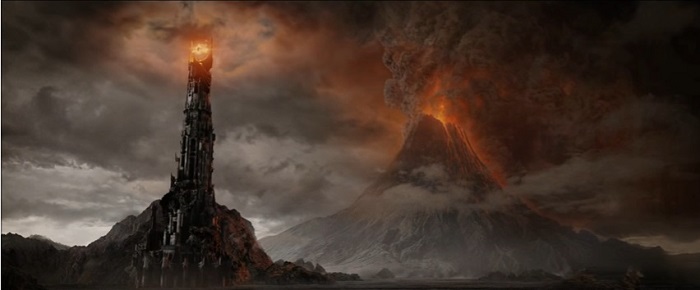
Editor’s note: Dear friends, while we may disagree with this author, even violently or vehemently, that’s great. We’re a community that allows space for dialogue—even for some of us to be “wrong.” That’s how we all learn. If we want to all agree with one another 100% of the time, there’s MSNBC or Fox News. elephant is not a yes-men club. Please be kind to one another in our speech, even in our disagreeing, which is welcome here. That’s what elephant is for. ~ Ed.
.
A darkness has set in over the world.
The crude braggart, the undisciplined liar, the hateful bully and the sexual violator is now the world’s most powerful man—and the consequences are rippling through our every thought about what it means to live in the world.
The election of Donald Trump is challenging us to come up with a language to describe the outrage and alienation few of us ever would have imagined experiencing just a few short months ago, and we may find we can explain a whole lot more by speaking in terms of an inverted moral order.
All across the world, murderers and thugs, fascists and nationalists are rising in power. Vladimir Putin and Bashar Al-Assad are winning in their genocide in Syria. Rodrigo Duterte is killing thousands and has threatened to kill 30,000 more drug users in what can often sound like a dystopian fiction in the Philippines. Nigel Farage and Marine Le Pen are tearing apart the European Union in openly racist campaigns. China and India are led by conservative nationalists, Egypt and Turkey by something more akin to fascists.
Everywhere, it seems the liberal and tolerant, the compassionate and sincere are losing while racists and nationalists rise to the top. It is the stuff of myth and legend, The Lord of the Rings and Star Wars. The moral order has been inverted and now the least virtuous man is its most powerful, while under him sits an ever more ghoulish band of thugs.
Liberals have never been very good at thinking in terms of moral order. Rather, we tend to think in terms of consequences: something is good if it brings about good consequences. And while bringing about good consequences often requires bold moral action, it is good things that we are bringing about, not a more just moral order.
And because we think in terms of consequences, when we turn our minds to politics, we talk a lot about policy. Hence, liberals confronted with the potential impeachment of Trump tend to ask whether the policy would be any better under Vice-President Pence. If not, then why speak of impeachment? But all of this fails to explain what is so wrong with Trump.
We all know, on some level, that the world is not just—but we imagine a just order in which the good prosper and the wicked suffer, the wise rule and the ignorant follow. And the closer we come to this order, the more we tend to feel settled and secure.
We feel settled and secure because we know we can trust our leaders, if not to do what is right, then at least to try to bring about some good. The trust reverberates through business and society, law and the family. As we all know from work, a good person at the top can change everything. If mistakes are made, then at least they are honest; if they do the wrong thing, then at least they believed in it—thus, we can forgive our leaders and live in peace with the powerful.
Trump can seem to us an abomination, and not merely because of his lies and his racism or his hatred and ignorance. These are all real enough but fail to get at the intensity of our gut reactions. There are things more morally blameworthy than racism, things more dangerous than ignorance.
Donald Trump behaves like a rash and intemperate child, proclaiming his greatness, ranting against adversaries, making impossible threats and insulting anyone who is a threat. He brags of violating women, then when they confront him, he claims they are not attractive enough for him to violate. He stirs up hatred against minorities, then claims they love him. This is not simply racist or sexist but something more akin to sociopathy.
He shows all the signs of a tyrant, but when the most powerful man in the world is a tyrant, we would do well to adopt a stronger language than that of mere racism and sexism. The language of a just moral order is theological and is admittedly more suited to conservatives. It is the kind of thing against which liberals tend to rankle. And for good reason, as it is an easy language to manipulate to illiberal ends. But it may describe better than anything else just what seems so wrong about Trump’s election.
Liberals all over the world must now fight an inverted moral order that casts down the virtuous and uplifts tyrants, that punishes goodness and rewards evil. And all of this will ricochet through every institution and every relation in our lives.
If the language of inverted moral order does not appeal to you, consider the even stronger mythological language of evil. Trump and his supporters now revel in their badness and seem to gain strength through flaunting it, and there is something evil in this revelry. It is not simply liberals and minorities who oppose what he is doing; it is all good people the world over.
Most of us are accustomed to refraining from such language because it denies the free choice of our political adversaries. Each of us will settle upon a set of political values and beliefs that others consider so dangerous to their own that they are tempted to call it evil. But seldom do we revel in how we might harm not only our adversaries goals, or even our adversaries, but moral norms agreed to by virtually everyone. This is what is so dangerous about Trump.
Whatever language you wish to adopt, racism and sexism is too light. It is time we begin to speak in the epic terms that such an inverted moral order deserves.
.
If you liked this article, please check out my book, Convergence: The Globalization of Mind, and follow me on Facebook to join the dialogue.
.
~
Author: Theo Horesh
Image: screenshot
Editor: Yoli Ramazzina
 Share on bsky
Share on bsky





Read 0 comments and reply